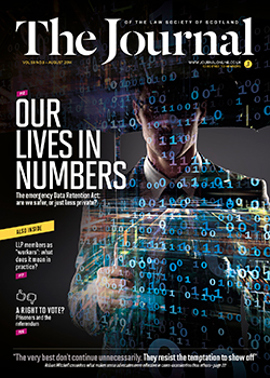President's column
The excitement of the Glasgow Commonwealth Games – with Scotland’s record-breaking medal haul and the numerous sporting achievements of the other participants – was undoubtedly a highlight of the past month. Along with so many others, I watched as much of the action as possible while carrying out the day job as a practising solicitor and fulfilling my presidential responsibilities.
The feelgood factor (mentioned last month in the context of Society events and the legal profession) was very much in evidence throughout the Games, which will hopefully deliver a lasting, positive legacy for Glasgow and the whole of Scotland. Needless to say, the success of the Games also renewed a sense of anticipation about next year’s Commonwealth Law Conference in Glasgow, which moves ever closer.
Preparations continue apace.
First principles
Just as a key attraction of the 2015 conference is the opportunity to meet colleagues from around the world and share experiences, so too the Judicial Institute for Scotland’s annual lecture last month provided a reminder of the important lessons we can learn from other jurisdictions. An inspiring lecture by Justice Albie Sachs, retired Justice of the Constitutional Court of South Africa, highlighted the importance of civility and collegiality among colleagues in the legal system. Justice Sachs, a human rights campaigner targeted by the authorities during apartheid and one of Nelson Mandela’s first appointments to the Constitutional Court, argued that civility, including respect for differing positions, should be regarded as a constitutional principle. We can look forward to similarly thought-provoking contributions at next year’s conference.
Learning from the best practice of others is also a key feature of the Society’s consultations on fundamental changes to the way Scottish solicitors are regulated. Before launching the two consultation papers – on the feasibility of moving towards entity regulation, and also the possibility of introducing principles and outcomes-focused regulation – the Society considered how regulatory systems worked in Canada and Australia as well as England & Wales.
Given that it seeks to protect and enhance the standards and reputation of solicitors, while providing a valuable public protection, regulation is among the Society’s most important work. Many changes have taken place in the legal profession and marketplace in recent years and the time is now right to consider whether the current approach remains the most appropriate. Neither the Society’s Council nor the Regulatory Committee has formed a view on the best way forward, so it is vital that as many members as possible respond to the consultations, which are distinct and should be considered separately. As ever, more information is available on the Society’s website.
CLIMAX OF THE DEBATE
With only a month to go until the vote on independence, the Society continues to play a prominent role in informing the debate, while remaining firmly non-partisan. The second paper on Scotland’s constitutional future set out a series of critical questions that remain unanswered on issues such as the economy, a Scottish tax regime, currency, EU membership, education, justice and the legal profession, and also how further devolution could be delivered in the event of a No vote. The issues go to the heart of the referendum debate, and both the campaigns, as well as the political parties, should provide answers to ensure that voters can make an informed choice next month.
In addition to the paper, two Society events this month will allow critical issues to be debated further. First, solicitors will be given the opportunity to put questions to Scottish Government Justice Secretary Kenny MacAskill and Advocate General Lord Wallace of Tankerness, and then a panel of international journalists at the Festival of Politics will discuss how the referendum campaign is being viewed around the world. More on the vote next month.
Finally, congratulations to the eight solicitor advocates, four civil qualified and four criminal qualified, who were sworn in at the Court of Session – yet more evidence, if any were needed, of solicitors’ ability to represent their clients in even the most complex cases.
In this issue
- Can solicitors be bystanders to offensive language?
- Driving away candidates
- Criminal injuries compensation – the new pitfalls
- Fish farms: a controlled environment
- Still trying to take care of the dead
- Permanence: beyond the past
- A series of unlikely events
- Reading for pleasure
- Opinion: Paul Motion and Laura Irvine
- Book reviews
- Profile
- President's column
- Count of 10
- People on the move
- Your life on file
- Drip, drip, DRIP: privacy draining away?
- LBTT: prepare to switch
- Workers: a class apart
- Dictation has a silver lining
- Don't cross them
- A case to make its mark?
- Variations on a theme
- Child abduction: recent developments
- Whistleblowing update
- Pension changes mean trustee alert
- Scottish Solicitors' Discipline Tribunal
- Changing elitism to equality
- Shape of the future
- Mentors wanted for scheme's second year
- Mandatory PC online renewal is coming for all
- Join wills charity drive
- Law reform roundup
- Carolyn's at the top of her Games
- Smartcards - the lawyer's friend
- With growth there is risk
- Ask Ash
- Smarter money
- Across borders
- Angles on immigration
- Legal aid – the hidden catches






